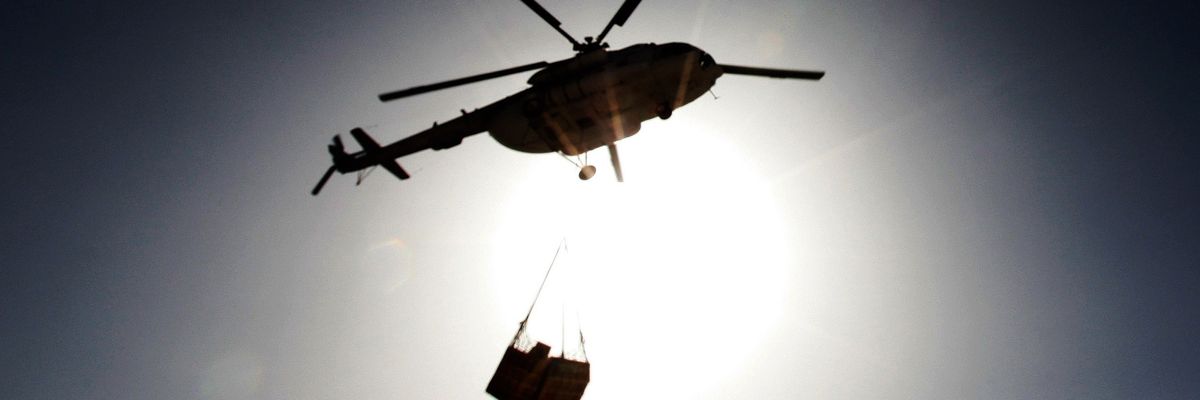The rapid collapse of the Afghan National Security Forces last summer and return to power by the Taliban laid bare the failed U.S.-led state-building efforts since 2001. The human and financial costs of the 20-year conflict were staggering — approximately 243,000 people died because of the war and the cost to U.S. taxpayers exceeded $2.3 trillion.
But the war wasn’t a failure for Pentagon contractors who enjoyed $108 billion in contracts for work in Afghanistan, with little oversight, according to a new paper by Brown University’s Cost of War Project.
The paper, authored by Heidi Peltier, finds that 13 companies received over $1 billion each in Pentagon contracts for work in Afghanistan. And those are just some of the contracts disclosed in federal databases. Over one-third of Pentagon contracts for work in Afghanistan — worth $37 billion — went to recipients who are not uniquely identifiable in publicly available contracting databases.
“When the DoD registers certain contract recipients as ‘undisclosed’ or ‘miscellaneous,’ it becomes difficult or impossible to track contract spending and thus to conduct oversight or assess effectiveness and waste,” said the paper.
A surprisingly large variety of contracts can be categorized under these opaque categories, including: contracts valued at $25,000 or less and the recipient is in a certain category, such as a student or a dependent of a veteran or officer; contracts worth over $25,000 and the recipient is based outside the United States; or when identification of the contractor could endanger the mission or contractor.
“The proportion of [contracts to] ‘undisclosed’ recipients is much, much higher in Afghanistan than for DoD contracts throughout the globe,” Peltier told Responsible Statecraft.
This may be due to fears of retaliation against U.S. government contractors in Afghanistan, said Peltier, but “as long as DoD (or any contracting agency) invokes the claim of security, the contracting guidance allows them to list the contractors as undisclosed or miscellaneous, preventing transparency and possibly oversight.”
Those broad loopholes for avoiding public transparency into the use of taxpayer money were flagged by the Congressional Research Service as, “limit[ing] transparency and precludes a contractor from being able to access and perform its own reporting requirements ... because the contract is not associated with the contractor in Federal-wide processes.”
The reliance on contractors for large parts of the Pentagon’s mission in Afghanistan led to outsourcing, often with limited disclosure of the recipients of contracts for crucial operations including operating army bases, providing fuel, training the ANSF, and serving as armed security guards.
“In short, military contractors provided all types of goods and services that were essential to the U.S. military presence in Afghanistan, including services (such as weapons maintenance and fuel supply) that made the U.S. military dependent on and arguably vulnerable to the performance of contractors,” wrote Peltier.
And, as Peltier notes, the oversight process itself isn’t immune from the shift towards contracting. A Government Accountability Office report in January 2021, detailed the troubling trend toward the Department of Defense outsourcing oversight of contractors to other contractors. “Some contracts in Afghanistan provided for the contractor to perform functions that closely support inherently governmental functions, such as evaluating another contractor’s performance or providing inspection services,” wrote the GAO.
“[The Department of Defense Office of Inspector General] also found oversight by the DoD itself to be insufficient or poorly executed, so really the oversight problems are both ‘the fox guarding the hen house’ as well as internal issues (which in some cases are because of corruption, and in other cases just poor execution),” said Peltier.
The flood of cash, a Defense Department contracting rule that enabled billions of dollars in contracts to undisclosed recipients, and weak oversight mechanisms all, no doubt, played a role in the staggering level of fraud and waste discovered by the Special Inspector General for Afghanistan Reconstruction in a January 2022 report: “SIGAR conservatively estimated nearly 30% of U.S. appropriations for Afghanistan reconstruction from 2009 to 2019 was lost to waste, fraud, and abuse.”
The Defense Department, probably exhibiting many of the problems highlighted by Peltier, was responsible for nearly 70 percent, $81.44 billion, of the $145.87 billion in reconstruction accounts reviewed by SIGAR.
“There should be a committee or other body to make determinations of whether certain contracts can legitimately be labeled as ‘undisclosed,’ […] to make sure there is no abuse of the system,” said Peltier.
But the problems of massive misspending of public funds may simply go alongside the growing role of contractors to fulfill the Pentagon’s missions.
“I would recommend the DoD reduce its contracting overall and return to providing more services in-house, including […] services like weapons maintenance and security, but also things like food services and lodging, in order to have more command in fulfilling its own needs and reduce the use of contracts and the opportunities for waste, fraud and abuse,” said Peltier.














